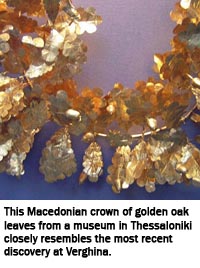Crown of Life or Crown of Death?
Friday, September 05, 2008
Sensational Discovery
In August 2008, Greek archaeologists discovered a priceless gold wreath in what is regarded as the ancient city of Aigai, the original capital of Macedonia and the place where Philip II, father of Alexander the Great, was assassinated in 336 BCE.
The crown of golden oak leaves was included along with human bones inside a golden cylinder, which itself was secured within a large copper vessel. Archaeologists have assigned its date to the fourth century BCE, at about the time when Philip and Alexander reigned. The excavation lies just outside of modern Verghina, a few miles east-southeast of Verea/Berea and about 320 miles (520 km) north of Athens.
Cultural Background
Such crowns were common in ancient times as symbols of success in a variety of contests, including military conflict, athletic contest, political election, academic achievement, business triumph, or trial at court. Often the crown (Greek: stephanos) was constructed from the leaves of plants such as the oak, olive, laurel, and pine trees, or even celery stalks.
The Christian's Crown
At the close of his life, the Apostle Paul describes what he had accomplished by God's grace: "I have fought the good fight, I have finished the race, I have kept the faith." He confidently adds, "Now there is in store for me the crown of righteousness, which the Lord, the righteous Judge, will award to me on that day-and not only to me, but also to all who have longed for his appearing" (2 Tim. 4:7-8). The "crown of righteousness" is a stephanos.
In the Apocalypse, Jesus Himself urges us, "Be faithful, even to the point of death, and I will give you the crown of life" (Rev. 2:10, again stephanos). In the heavenly throne room vision that follows, the Apostle John reports seeing 24 elders dressed in white wearing golden crowns. Soon each throws down his crown (stephanos) before the One on the throne, apparently symbolizing their dependence on Him for their victory. They confess that as Creator, He is worthy of glory, honor, and power (Rev. 4:4, 10-11). These same elders remain throughout the rest of the prophetic vision as witnesses of God's awesome deeds (see Rev. 5:8, 14; 7:13-17; and 19:4). Later Christ ("the Word of God") is pictured as wearing many crowns (Rev. 19:12), but this word for "crown" is diadema, the circlet of silver or gold worn by royalty.
Our Contest
Like the military conflict, the Christian life is a battle. Sometimes the salvos come at us unexpectedly, all hot and heavy. Sometimes we get wounded from friendly fire. Like the athletic competition, we are running hard and sometimes getting exhausted. The things that make a big difference are training, teamwork, confidence, and persistence. Like the political campaign, our opponent is a determined fighter and slings mud. We suffer innuendo, slander, and gossip.
Like students, we must prepare ourselves if we want to pass the exam. Like the businessperson, we must anticipate the competition and strive to add value to what we offer. Like the defendant, we have to gather the evidence and present our case, relying on the Judge's integrity to render a fair verdict. And when the bell of the final round has rung, when we stand with Paul at the finish line, still holding the baton, we look forward to those words, "Well done!" and to receiving that crown.
We don't expect to go to the grave wearing a wreath of golden oak leaves. Scripture's crown is a crown of life, not of death. What we are hoping for is resurrection to an eternal life in intimate fellowship with the Father, with His Son, and with the Spirit! Our triumph, our victory, our success-it will all be due to the Father's grace, the Son's redemption, and the Spirit's empowerment. After all the trials, when the contest is over and the campaign has wound down, victory at last will be sweet.
Want to Go Deeper?
Take a look at the other passages in the New Testament that describe the stephanos, which the overcomer will receive. They include: 1 Cor. 9:25; Phil. 4:1; 1 Thess. 2:19; James 1:12; and 1 Peter 5:4. All verses in the gospel accounts refer to the crown of thorns Jesus wore on the cross, ironically symbolizing His bloody and agonizing victory.
In another passage, Paul uses the verb form of stephanos to warn that Christians might not be crowned unless they compete according to the rules (2 Tim. 2:5; see also 1 Cor. 9:24, 27). Not everyone who starts out the race crosses the finish line. Many things hinder and sin "so easily entangles." We must "run with perseverance the race marked out for us" (Heb. 12:1). How do these warnings mesh with texts like 1 John 5:13 that reveal that Christians can know they have eternal life?
Recommended for online reading...
Steve Singleton. "The Isthmian Games" (includes some images of stephanoi).
Walter Grundmann, "Stephanos" in Theological Dictionary of the New Testament (7:615-636); see also the condensed version (only some of which is available online).
Recommended for purchase...
Robin Osborne. Archaic and Classical Greek Art (1998).
Steve Singleton, DeeperStudy.com
Labels: crown of life, overcomer, stephanos, victor's crown, victory crown